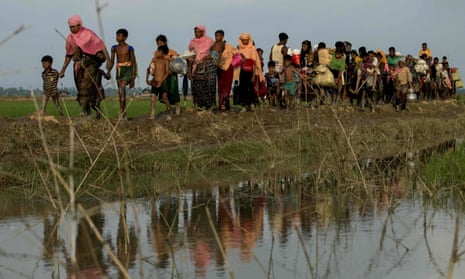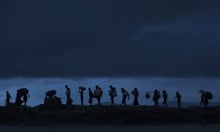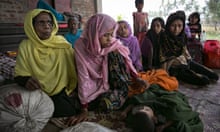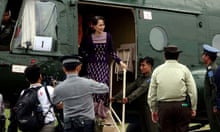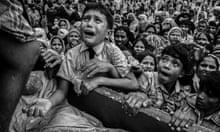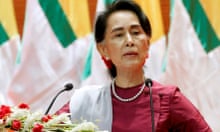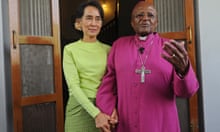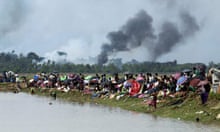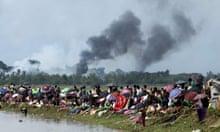The United Nations secretary-general, António Guterres, has appealed to Myanmar to end the violence that has led more than 120,000 Rohingya people to flee in the last two weeks, which he warned was “creating a situation that can destabilise the region”.
The unrest has raised fears of a humanitarian crisis in overstretched border camps, with another 400,000 of the Muslim ethnic minority estimated to be trapped in conflict zones in western Myanmar since more “clearance operations” by security forces in Rakhine state began last month.
Guterres told reporters he had written to the security council to express his concern. When asked about ethnic cleansing, Guterres said: “We are facing a risk, I hope we don’t get there.”
UN aid agencies continue to be blocked from delivering food, water and medicine to the Rohingya, while humanitarian workers on the ground say warehouses stocking vital emergency supplies are being looted.
As the international outcry over the crisis grew, an aid group that has been rescuing tens of thousands of refugees from the Mediterranean Sea announced it was redirecting its ship to south-east Asia.
Migrant Offshore Aid Station said it was suspending its operations off the Libyan coast and sending the vessel to the Bay of Bengal. The Malta-based organisation, which has rescued about 40,000 refugees attempting to reach Europe in the last three years, said it would focus on providing aid on the Myanmar-Bangladesh border “where a deadly exodus is unfolding”.
It cited Pope Francis’s appeals for an international response to the plight of the Rohingya people. The number of refugees fleeing Libya has dropped significantly since the country increased naval patrols and militia groups agreed to crack down on smuggling.
The UN announced on Tuesday that the number of Rohingya to have reached Bangladesh in recent days was estimated to be 123,600. Up to 15,000 Rohingya refugees are expected to cross the Naf river into Bangladesh each day this week, joining the tens of thousands already taking shelter in overcrowded camps and makeshift settlements.
Aid groups say supplies are rapidly falling while medical clinics are overwhelmed by a 40-50% increase in patients, some with serious injuries.
Q&AWho are the Rohingya and what happened to them in Myanmar?
Show
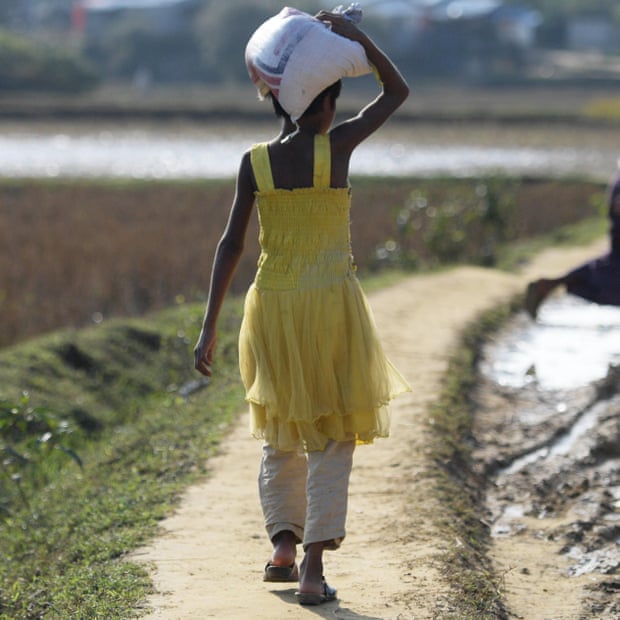
Described as the world’s most persecuted people, 1.1 million Rohingya people live in Myanmar. They live predominately in Rakhine state, where they have co-existed uneasily alongside Buddhists for decades.
Rohingya people say they are descendants of Muslims, perhaps Persian and Arab traders, who came to Myanmar generations ago. Unlike the Buddhist community, they speak a language similar to the Bengali dialect of Chittagong in Bangladesh.
The Rohingya are reviled by many in Myanmar as illegal immigrants and suffer from systematic discrimination. The Myanmar government treats them as stateless people, denying them citizenship. Stringent restrictions have been placed on Rohingya people’s freedom of movement, access to medical assistance, education and other basic services.
Violence broke out in northern Rakhine state in August 2017, when militants attacked government forces. In response, security forces supported by Buddhist militia launched a “clearance operation” that ultimately killed at least 1,000 people and forced more than 600,000 to flee their homes. The UN’s top human rights official said the military’s response was "clearly disproportionate” to insurgent attacks and warned that Myanmar’s treatment of its Rohingya minority appears to be a "textbook example” of ethnic cleansing.
When Aung San Suu Kyi rose to power there were high hopes that the Nobel peace prize winner would help heal Myanmar's entrenched ethnic divides. But she has been accused of standing by while violence is committed against the Rohingya.
In 2019, judges at the international criminal court authorised a full-scale investigation into the allegations of mass persecution and crimes against humanity. On 10 December 2019, the international court of justice in The Hague opened a case alleging genocide brought by the Gambia.
Another estimated 20,000 people are stranded in the “no man’s land” between the two countries, having been denied entry by Bangladesh border guards, although thousands continue to cross through unguarded areas.
The latest wave of refugees, the second significant surge in the past year, was sparked on 25 August after Rohingya militants attacked government forces, who responded with a counter-offensive that has killed hundreds.
Refugees who have made it to Bangladesh have told of massacres and arson they say are being committed by armed forces. Human Rights Watch has cited satellite evidence of widespread burning in at least 10 parts of Rakhine state in the days after the armed crackdown began.
The government has said rebels are burning their own villages and accused them of killing Buddhists and Hindus, a claim repeated by some residents. The Myanmar military said 400 people had been killed, the vast majority of them “terrorists”. UN officials have estimated the death toll at “around a thousand”.
Media and independent observers are denied access to Rakhine and the figures cited by the government and Rohingya activists are impossible to verify.
The Rohingya have been persecuted for decades in Myanmar but the recent violence is seen as a major escalation because of the scale of the destruction and the involvement of a new Rohingya militant group, the Arakan Rohingya Salvation Army.
The UN estimated in May this year that since 2012 about 168,000 Rohingya had fled Myanmar, where the group is denied citizenship and access to basic government services.
International pressure is growing on Aung San Suu Kyi, Myanmar’s de-facto leader and a Nobel peace laureate, to intervene decisively and curb the military operations.
More than 300,000 people have signed an online petition asking the Nobel committee to rescind the prize awarded in 1991 for her democratic activism during the years the country was run by a military junta.
In recent years the military has relaxed its grip on the country but it remains an influential force and holds 25% of parliamentary seats.
The UN special rapporteur on human rights in Myanmar, Yanghee Lee, said on Monday the situation in Rakhine state was “really grave” and it was time for Aung San Suu Kyi to step in.
Lee said Aung San Suu Kyi, whose party won the country’s first free elections in a generation in 2015, was “caught between a rock and a hard spot. I think it is time for her to come out of that spot now.”
A Burmese human rights group said on Tuesday that the persecution of Muslims in the Buddhist-majority state had grown in the last five years and extended beyond Rohingya people to include the creation of “Muslim-free zones” across the country.
“The transition to democracy has allowed popular prejudices to influence how the new government rules, and has amplified a dangerous narrative that casts Muslims as an alien presence in Buddhist-majority Burma,” the London-based Burma Human Rights Network said in the report.
Images and reports of the renewed plight of the Rohingya people have drawn condemnation across the world, including from Aung San Suu Kyi’s fellow Nobel laureate Malala Yousafzai.
The Turkish president, Recep Tayyip Erdoğan, has described the violence as a genocide and said Turkey would compensate Bangladesh for taking in the refugees.
On Monday, demonstrations were held in the Russian republic of Chechnya, where the leader, Ramzan Kadyrov, compared the treatment of the Rohingya to the Holocaust.
